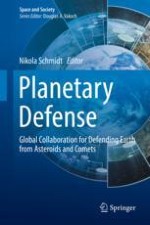2019 | OriginalPaper | Buchkapitel
14. Conceptualizing the Asteroid Threat and Searching for a Balanced Answer Between Effectiveness and Desirability
verfasst von : Nikola Schmidt
Erschienen in: Planetary Defense
Aktivieren Sie unsere intelligente Suche, um passende Fachinhalte oder Patente zu finden.
Wählen Sie Textabschnitte aus um mit Künstlicher Intelligenz passenden Patente zu finden. powered by
Markieren Sie Textabschnitte, um KI-gestützt weitere passende Inhalte zu finden. powered by
